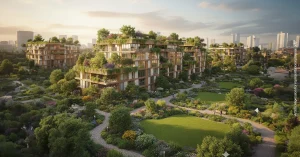Sustainable Urbanisation By Mahindra Lifespaces

From being a predominantly agrarian economy, India has, in the past few decades gradually but surely, shifted to urban growth and development. Today, India’s cities contribute almost 2/3rd of its economic output. Although this has made some of the Indian cities to grow at a rapid rate, it has also posed some serious problems to the urban landscape in terms of the environment as well as meeting the rising infrastructure and basic needs of the population. These urbanisation challenges have prompted an urgent need to have a more holistic and sustainable approach to real estate development.
Mahindra Lifespaces, one of the leading real estate developers in India, has recognized the urgent necessity of building responsible footprint in their businesses and have put in place a holistic business strategy that encourages an eco-friendly approach to all their businesses.
Pioneers in the integrated cities and industrial clusters segment, sustainable urbanisation is at the core of Mahindra Lifespaces work ethics with a focus on optimizing consumption of natural resources across their lifecycles. This has resulted in a 100% green portfolio an achievement that is looked upon with utmost pride in the company.
Mahindra Lifespaces is committed to transforming India’s urban landscape through sustainable communities, including residential developments, that are attuned to the needs of society and the environment and which is truly reflected in some of the brands such as Lifespaces, Happinest, Mahindra World Cities, and ORIGINS by Mahindra World City. Over the last two and half decades, Mahindra Lifespaces has developed more than 16 million sq. ft. of projects and has over 8.84 million sq. ft. of ongoing and forthcoming projects, in addition to 5063 acres under development/management across its integrated cities and industrial clusters.
The credo of ‘Sell Genuinely, Build Responsibly, Deliver on Time’ is aided by the sustainability policy that includes building enduring business, while rejuvenating the environment and enabling stakeholders to rise. The policy comprises four pillars including Sustainable Products, Sustainable Sites, Sustainable Offices, and Sustainable Communities.
Mindful of the risks that climate change as well as resource scarcity is posing to the real estate industry, Mahindra Lifespaces have adopted sustainable development practices with energy-efficient materials and technologies, responsible consumption of natural resources, and pollution mitigation. This has resulted in ORIGINS, Chennai, ORIGINS, Ahmedabad, Centralis, Pune, Roots, Kandivali, and Happinest, Palghar being successfully certified green by IGBC/GRIHA during the last financial year.
Some highlights of these projects include water efficiency (freshwater requirement reduced by 25%, recharged natural groundwater levels due to rainwater harvesting), energy efficiency (through usage of LED lights, low density cellular lightweight concrete blocks etc.) ventilation (optimal window-wall ratio for maximum ventilation and daylight) and organic waste converter to create manure from waste.
- As per the 2018-2019 sustainability report, more than 60% of waste generated from Mahindra World Cities was diverted away from landfills.
- Since its inception in 2014, through sustainable communities more than 100 schools (in Tier 1 cities), over 20,000 students and 80,000 citizens through the flagship Green Army initiative were reached to support the cause.
- As per the 2018-2019 sustainability report, close to 15,000 volunteers planted 150,000 saplings over 140 acres of land at Mahindra World City, Chennai.
- The company supported development of the State Green/Affordable Housing Policy in Maharashtra and the Green Building Incentive Policy in Karnataka in 2018-19.
Mahindra Lifespaces have committed to the Science Based Targets initiative (SBTi) for upcoming growth and are now looking to intensify their goals and initiatives for sustainable living through ‘Sustainability 2.0’ journey. These initiatives aim to achieve sustainable development goals, adopt science based targets across the value chain, and achieve zero waste to landfill for the sites, all in the effort to create cities that are future ready!



















